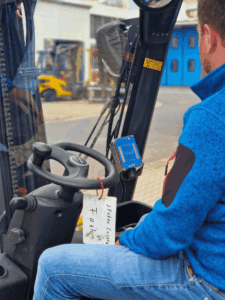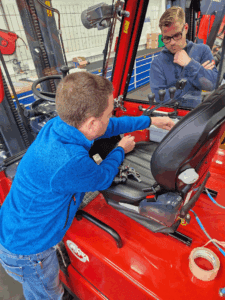BASF: Safety and efficiency in fleet management
Mobile Easykey in the world's largest chemical complex
A forklift workshop and office – in the middle of BASF’s 10-square-kilometer main plant in Ludwigshafen. Within sight of the workshop, which manages the company’s entire industrial truck fleet, it becomes clear that safety and efficiency are not marginal issues at the world’s largest contiguous chemical plant, but rather a fundamental principle that is put into practice.

A dedicated industrial truck fleet at the heart of BASF
BASF relies on its own clearly structured fleet management system: around 2,600 industrial trucks are maintained – around 1,800 of them in Ludwigshafen with full service and its own workshop.
The industrial truck pool takes care of procurement and rental and advises the companies on the factory premises on the efficient use of the vehicles. “We support the operations in finding the optimal equipment. Safety, costs, and utilization are always the focus – which is exactly why Mobile Easykey has its place here,” explains operations assistant Daniel Schneider. The workshop attached to the industrial truck pool at the site is responsible for maintenance, servicing, and repairs and ensures that the fleet remains operational at all times.
The goal: greater safety in the Y130 transshipment warehouse
In 2016, the decision was made to introduce Mobile Easykey (MEK) – initially in the plant’s largest transshipment warehouse (known as “Y130” in the BASF world). Around 70 vehicles were in use there, and the aim was to improve the interaction between safety and transparency in order to prevent incidents that occurred despite comprehensive safety measures.
“The focus is always on reviewing incidents: What exactly happened and how? And how can we prevent incidents in the future?” says Daniel Schult, who was involved in the introduction. The combination of crash sensor and access control proved to be a tailor-made solution that convinced both the works council and department management. As a result, MEK was not only introduced for Y130, but also for other operations where industrial trucks are used – regardless of the forklift brand. As a manufacturer-independent system, Mobile Easykey is an “adapter” that enables safe operation with all vehicle types.
Technology and acceptance as key factors
Compared to other systems, Mobile Easykey scored points with its dual sensor concept and the option of individually adjusting sensitivity through learning drives. “The ability to precisely tailor the sensors to the respective environment was crucial for acceptance,” reports Schult.
Data protection was also a key issue from the outset: all data is stored exclusively on BASF’s own server and only in anonymized form. Together with the works council, clear rules were drawn up for data storage and needs-based data evaluation.
Improved processes and greater responsibility
The introduction of Mobile Easykey led to immediate, noticeable improvements: less damage, more efficient processes, and a greater sense of responsibility. Drivers benefit from the fact that processes can be objectively tracked. It quickly became clear that fairness, safety, and support in everyday life are key.
“Today, Mobile Easykey is spreading almost by itself within BASF’s operations thanks to positive user reports,” reports workshop foreman Christoph Kupper, who is responsible for technical support. “The combination of safety, transparency, and ease of use convinces everyone involved.”
From explosion protection to autonomous machines
Around 20 companies on the factory premises now use Mobile Easykey – not only on conventional forklifts, but also on hand-guided devices and autonomous machines. A particular milestone was the introduction of the explosion protection module for areas subject to explosion protection criteria. This enabled BASF to ensure secure access control even in highly sensitive areas.
Future-proof and robust
Mobile Easykey is now an integral part of BASF’s safety and efficiency concept in intralogistics:
• 95% of the modules are connected to the database via mobile communications – independently of the Wi-Fi on the extensive site.
• The modules can withstand several vehicle generations and more than 10,000 operating hours.
• Authorizations for special vehicles are assigned directly in the system.
• Automatic shutdown after crashes protects material and energy.
“The demand for intelligent solutions remains unbroken,” emphasizes Kupper. “And awareness of the added value of Mobile Easykey has long been established.”
Mobile Easykey at BASF thus stands for sustainable safety, responsible use of equipment, and technical reliability—from the forklift fleet in the transshipment warehouse to sensitive explosion protection applications. It is a system that not only impresses technically, but also has a lasting impact on the safety culture in the world’s largest chemical complex.

Facts and figures BASF Ludwigshafen
BASF’s headquarters in Ludwigshafen is the largest chemical complex in the world: around 33,000 people work in over 125 production facilities covering an area of 10 square kilometers. The plant is connected by 2,850 kilometers of pipelines, 230 kilometers of rail tracks, and 106 kilometers of roads. With more than 8 million tons of products per year, Ludwigshafen remains the heart of the BASF Group, which employs 111,800 people worldwide and most recently generated sales of €65.3 billion.

